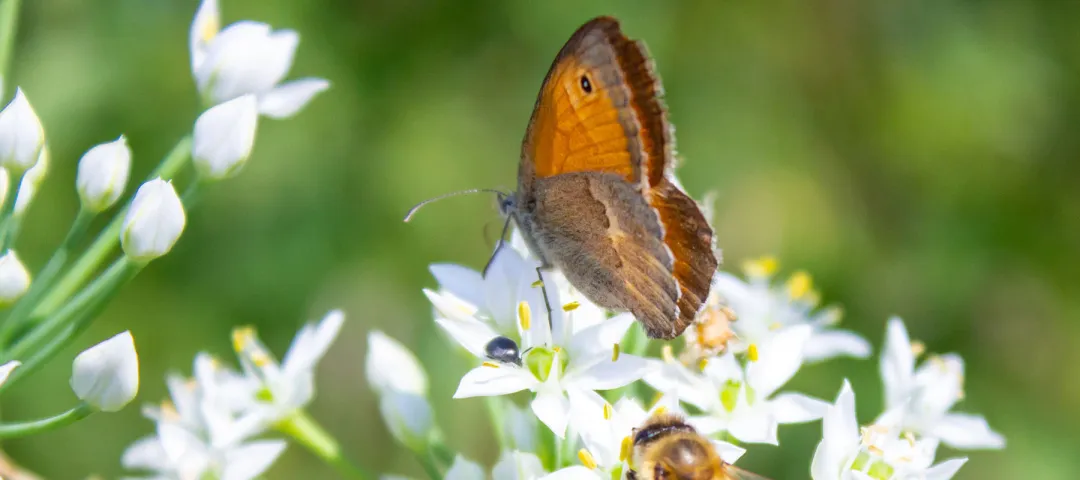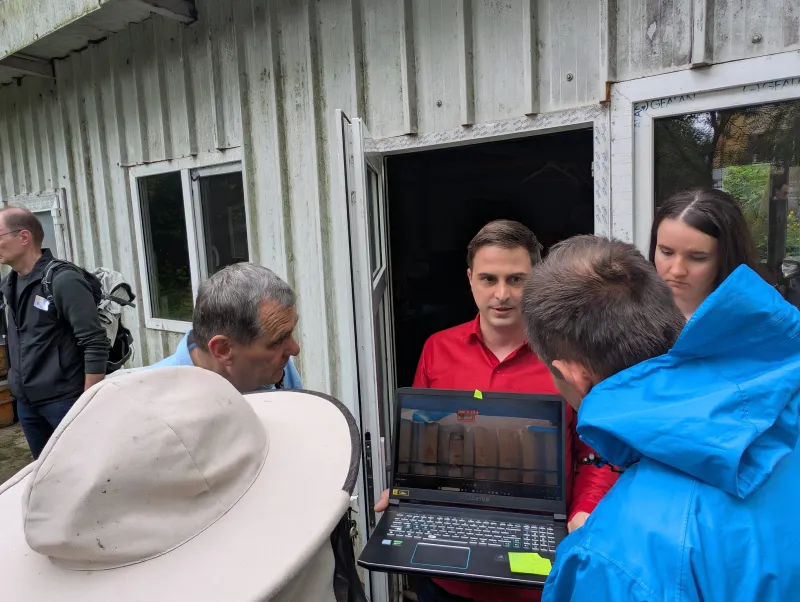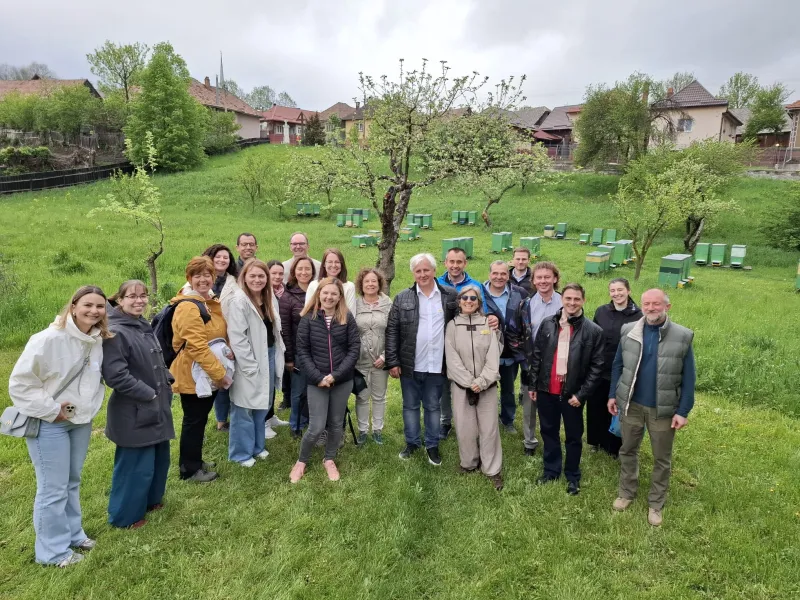Der Gegenbesuch „Honigbienen und andere Bestäuber“ fand vom 7. bis 8. Mai 2025 in Rumänien statt.
Insektenbestäuber wie Bienen, Schmetterlinge und Schwebfliegen spielen eine Schlüsselrolle bei der Produktion nährstoffreicher und hochwertiger Lebensmittel. Bestäuber erbringen und unterstützen viele weitere sogenannte Ökosystemleistungen, die zur allgemeinen Gesundheit und zum Wohlbefinden der Menschen sowie zur Erhaltung gesunder Ökosysteme beitragen. Heute jedoch verschwindet jede dritte Bienen-, Schmetterlings- und Schwebfliegenart in der EU. Landnutzungsänderungen und intensive landwirtschaftliche Bewirtschaftungsmethoden, Parasiten und Krankheiten, invasive Arten, Umweltverschmutzung und der Klimawandel gehören zu den dringendsten Herausforderungen für Bestäuber. Von der EU-Initiative für Bestäuber bis zum neuen Naturwiederherstellungsgesetz gibt es zahlreiche Initiativen auf EU-Ebene, die darauf abzielen, diese Herausforderungen anzugehen.
Im Rahmen der GAP gibt es mehrere Projekte der Operationellen Gruppen der EIP-AGRI, die sich mit dem Rückgang der Bestäuber befassen und sich unter anderem auf die Verbesserung des Schutzes und der Vielfalt von Bestäubern, die Bekämpfung von Bienenparasiten und -krankheiten, Innovationen in der nachhaltigen Imkerei und die Entwicklung agroökologischer Strategien zum Schutz von Bestäubern auf landwirtschaftlichen Flächen konzentrieren.
Hauptziel
Das Hauptziel der gegenseitigen Besuche des EU-GAP-Netzwerks ist die Förderung eines intensiven, transnationalen Wissensaustauschs durch die Vernetzung von EIP-AGRI-Operationellen Gruppen aus verschiedenen Mitgliedstaaten, die im gleichen Arbeitsbereich tätig sind.
Die Projekte der Operationellen Gruppen (OG) von EIP-AGRI generieren neues Wissen und wertvolle Erfahrungen. OG, die sich mit ähnlichen Herausforderungen befassen, können unterschiedliche Ergebnisse erzielen und voneinander lernen. Projekte, die sich mit komplementären Themen befassen, können sich gegenseitig inspirieren, während in anderen Regionen und Ländern neue OG entstehen können, die sich mit ähnlichen Themen befassen. Um auf dem generierten Wissen aufzubauen und dessen potenzielle Wirkung zu maximieren, sind Interaktionen zwischen Projekten und über Grenzen hinweg unerlässlich.
Spezifische Ziele
- Förderung des Peer-to-Peer-Lernens: Bereitstellung einer Plattform für OGs, um voneinander zu lernen und sich über Erfahrungen, Innovationen und bewährte Praktiken auszutauschen. Die Teilnehmer erhalten Einblicke in verschiedene Ansätze zur Bewältigung gemeinsamer landwirtschaftlicher Herausforderungen.
- Austausch innovativer Praktiken: Erleichterung des Austauschs innovativer Lösungen und Technologien, die in OG-Projekten entwickelt wurden. Die Teilnehmer können beurteilen, ob diese Innovationen in ihren eigenen Regionen anwendbar sind.
- Diskussion von Herausforderungen und Lösungen: Schaffung einer Gelegenheit für OGs, gemeinsame Herausforderungen, Hindernisse und mögliche Lösungen zu diskutieren. Die gemeinsame Problemlösung und der Wissensaustausch werden gefördert.
- Verbreitung der Projektergebnisse: Förderung der Weitergabe von Ergebnissen und Erkenntnissen über die einzelnen OGs hinaus. Dies trägt zur breiteren Anwendung erfolgreicher Praktiken und Innovationen in der gesamten EU bei.
- Aufbau von Kooperationen und Partnerschaften: Ermutigung der OGs, Möglichkeiten für künftige Kooperationen, Partnerschaften und gemeinsame Projekte zu erkunden. Dies verstärkt die Wirkung der Initiativen des EU-GAP-Netzwerks.
Sehen Sie, was die Teilnehmer der letztjährigen Gegenbesuche über ihre Erfahrungen gesagt haben.
Werfen Sie einen Blick in die Berichte über die letzten Gegenbesuche.
- Gegenbesuch des EU-GAP-Netzwerks „Nutzung von land- und forstwirtschaftlichen Reststoffen zur Schaffung alternativer Einkommensquellen für Land- und Forstwirte“ | EU-GAP-Netzwerk
- EU-GAP-Netzwerk-Gegenbesuch „Klimaanpassung vor Ort – innovative Lösungen zur Stärkung der Widerstandsfähigkeit landwirtschaftlicher Betriebe“ | EU-GAP-Netzwerk
Bei Fragen wenden Sie sich bitte an crossvisit.innovation@eucapnetwork.eu.
Weitere Informationen zu den Gegenbesuchen finden Sie hier.
Programme
Agenda - Cross Visit - ‘Honeybees and other pollinators’
(PDF – 458.67 KB)
Additional info
Organiser

EU CAP Network
Interessenverteter der EU
Support

Support Facility for Innovation & Knowledge exchange | EIP-AGRI
EU-GAP-Netzwerk





















